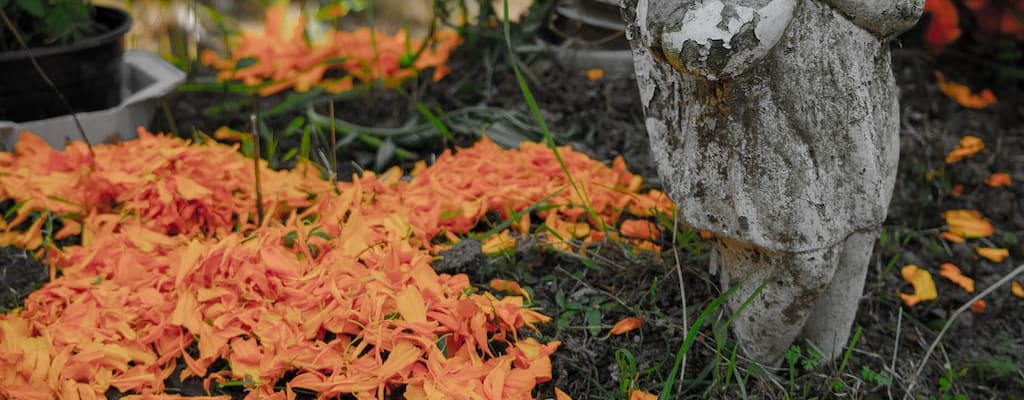take someone to the grave: Idiom Meaning and Origin
What does ‘take someone to the grave’ mean?
The idiom "take someone to the grave" means to keep a secret or confidential information hidden and never reveal it, even after death.
This phrase suggests a strong determination to protect the secret and maintain loyalty and trust, even when faced with extreme circumstances.

Idiom Explorer
The idiom "turn in one's grave" means to experience strong disapproval or disappointment, symbolically imagined as the deceased person's reaction to a particular event or situation.
The idiom "take to the bank" means to consider something as certain or reliable, usually in the context of information or promises that can be trusted and relied upon without any doubt or hesitation.
The idiom "take to heart" means to deeply and emotionally internalize something, often a criticism or advice, and allow it to affect one's thoughts, feelings, and behavior.
The idiom "take the fall" means to accept blame or punishment for a mistake or wrongdoing, often to protect someone else or to avoid greater consequences.
The idiom "take something to the grave" means to keep a secret or piece of information hidden for one's entire life, never revealing it to anyone, even on their deathbed.
The idiom "take someone's word for it" means to believe or trust what someone says without requiring further proof or evidence.
The idiom "take someone's head off" means to yell or speak to someone angrily or aggressively.
The idiom "take someone's arm" means to hold someone's arm, often to guide or support them physically or emotionally.
The idiom "take soil" means to be buried or interred in the ground after death.
The idiom "take out an onion" means to reveal or disclose information that is hidden or secret. It implies the act of peeling away layers, just as one peels an onion to unveil its layers. The idiom is often used in contexts where someone uncovers the truth or exposes hidden motives.
Enigmatic Burden: Unveiling Secrets
The idiom "take someone to the grave" is a commonly used phrase that means to keep a secret or piece of information confidential until death. It originated in the 19th century and is often used in the context of someone having knowledge or information that they vow to never reveal, even if it means taking it to their grave.
This idiom is figurative and does not require an actual grave or burial. It is used to emphasize the extreme level of secrecy and confidentiality associated with the information being kept.
When someone says they will take something to the grave, they are making a solemn vow to keep the information hidden and unrevealed for the rest of their life.
This idiom holds a powerful impact, as it implies a level of trust and determination in the person making the statement. It conveys their unwavering commitment to maintaining the secrecy of the information, even in the face of potential consequences or scrutiny.
The use of the word "grave" in the idiom adds a sense of finality and permanence, reinforcing the idea that the secret will remain buried forever.
While the origins of this idiom remain shrouded in mystery, its usage and meaning have been carried on through generations. It encompasses the human desire for secrecy, trust, and the preservation of sensitive information.
The idiom "know where the bodies are buried" is another phrase that relates to the concept of secrets and hidden information. It means to have inside knowledge or incriminating evidence about a situation or group of people.
This idiom suggests that the person speaking knows not only the secrets themselves, but also where they are hidden or buried, metaphorically speaking.
It implies a level of power and control over others, as well as the potential to use this knowledge to manipulate or exert influence.
Similar to "take someone to the grave," "know where the bodies are buried" emphasizes the importance of keeping secrets and the potential consequences that can arise if these secrets are revealed.
The idiom "turn in one's grave" is yet another expression that is connected to the concept of graves and burial. It is used to describe a situation where someone would be greatly disturbed, upset, or outraged if they were alive to witness it.
This idiom suggests that the person being referred to is so linked to a particular belief, value, or principle that the mere thought of an action or event contrary to that belief would cause them to figuratively turn in their grave.
It highlights the idea that certain actions or events would be seen as a betrayal or violation of what the person held dear, even beyond death.
Lastly, the idiom "take soil" is an expression that relates to the act of burying a deceased person. It is a more literal phrase that signifies the physical act of placing soil onto a grave or burial site.
This idiom can be used to describe the final step in the process of burying someone, symbolizing the completion of the burial and the beginning of the grieving and healing process for the loved ones left behind.
Overall, these idioms, including "take someone to the grave," "know where the bodies are buried," "turn in one's grave," and "take soil," all have connections to the concept of graves, burial, secrets, and hidden information.
They emphasize the importance of secrecy, trust, and the preservation of sensitive information, while also highlighting the potential consequences that can arise if these secrets are revealed. These idioms serve as reminders of the power and impact that our words, actions, and knowledge can have, even beyond death.
They also invite us to reflect on the countless stories, secrets, and untold narratives that may never come to light, as they are destined to remain buried alongside those who vowed to keep them hidden.
Example usage
Examples of how the idiom "take someone to the grave" can be used in a sentence:
1. She had promised her best friend that she would never reveal the secret, and she took it to her grave.
2. Despite being questioned by the police, the old man refused to betray his accomplice and took the information to the grave.
3. The famous author's unpublished works were discovered after his death, proving that he had taken many great stories to the grave with him.
More "Death" idioms



